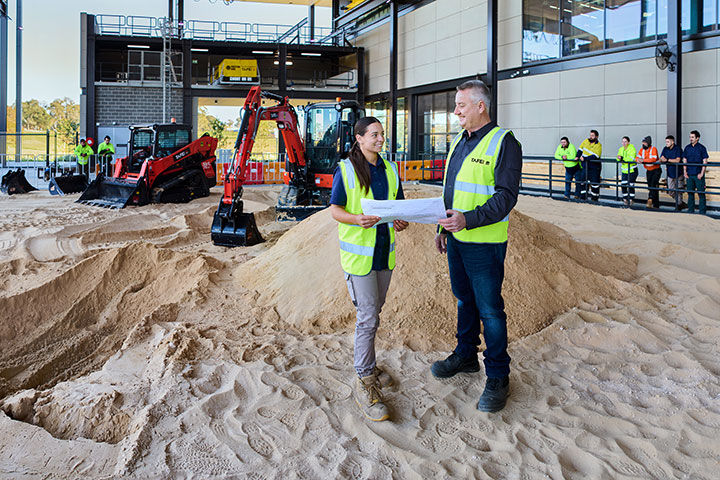Skip to main content
Start quiz
- Go to homepage
- Course areas
- Civil Construction and Surveying
- Certificate III in Civil Construction (Civil Construction General)
Back to:Civil Construction and Surveying
National code: RII30920
Certificate III in Civil Construction (Civil Construction General)

Overview
About this course
Build the practical skills you need to get your start in the dynamic civil construction industry. Get an all-rounder’s introduction, become a qualified civil construction worker and help to shape the future of Australia’s infrastructure.
Outcomes
What you'll gain
Learning outcomes
Through a mixture of theory and practical course work, learn to:
Plan and organise civil construction tasks
Read and interpret plans
Use hand and power tools
Operate a small plant and equipment
Follow work health and safety (WHS) procedures
Perform measurements and calculations
Course outcomes
Gain practical experience and develop specialist skills that give you an advantage in the job market.
Experience liaising with real clients and stakeholders
Skills in working to project deadlines
Experience working on a real work site with colleagues and supervisors
The ability to use a variety of hand tools, power tools, and civil construction equipment
A strong pathway to continue your study and enhance your career opportunities
Suitability
Is this course right for you?
Entry requirements
This course requires evidence of previous experience or study before you can enrol.
A general construction induction card (commonly known as a white card) – you will need this before you can enter a construction site
Check the campus page for requirements to take this course as an apprenticeship
Note:
This course may also be offered as a non-apprenticeship. Enquire today to discuss your eligibility
Completion requirements
During your study you’ll need to provide your teacher with the following evidence:
Entry recommendations
To be prepared for this course, we recommend that you have:
A general construction induction card (commonly known as a white card) – you will need this before you can enter a construction site
Have good hand-eye coordination and the ability to use hand tools
Are comfortable working at heights and in confined spaces
Have an intermediate level of fitness to manage physical tasks like shovelling, moving surveying equipment, and walking long distances
The ability to work well as part of a team
A commitment to safety
Note:
A valid form of ID to prove you are at least 18 years old as part of SafeWork NSW requirements to undertake the SafeWork NSW High Risk Work Licence assessment conducted via this course.
You must successfully pass both the TAFE NSW and SafeWork NSW High Risk Work Licence assessments to be eligible for your SafeWork NSW High Risk Work Licence. For more details, see the licensing section below.
You can plan your work and try to solve problems on your own.
You can understand documents you see often in everyday life.
You can write short sentences or lists to share information
You can ask and answer questions in a simple conversation.
You can solve maths problems you often see in real life.
You can turn on a digital device and follow simple steps.
We tailor our courses to meet local community needs, so some campuses may have extra entry requirements. Check your preferred location for details. Need help preparing? Contact us for support.
Find Your Fit
This simple tool guides you to a suitable course level based on your foundation skills and confidence.
Pathways
Future career and study options
Career pathways
Our graduates go onto roles like:
Earthmoving Plant Operator (General)
Earthmoving Plant Operators (General) operate a range of earthmoving plants to assist with building roads, rail, water supplies, dams, treatment plants and agricultural earthworks.
Full-time share Full-time workers usually work 35 hours or more a week (in all their jobs combined).
93%
Employment size Employment size is the number of workers who do this as their main job.
2,400 workers
Average age This is the average age of all workers in this job.
48 years
Weekly pay Median earnings are shown for full-time, non-managerial employees paid at the adult rate, before tax or any amounts that are salary sacrificed. These figures are a guide to earnings only and should not be used to determine a wage rate.
$1,640
Average full-time The average full-time hours that people in this role work each week.
48 hours
Skill level rating Skill level ratings are based on the range and complexity of job roles. In general, the higher the skill level, the more formal education and training, previous experience or on-the-job training needed to be good at the job.
Lower
Gender share
2% female
Future growth The Department of Employment, Skills, Small and Family Business estimates the likely change in number of workers in this role, or industry, over the next 5 years. Future growth is the likely percentage change compared to all other job roles.
Strong Growth
Other jobs include: civil construction worker, civil construction road surfacing worker, civil construction site maintenance worker, civil construction road maintenance worker, civil construction bridge maintenance worker, civil construction pipe laying worker and civil construction mobile plant worker.
Licensing
This course leads to a licensed occupation in NSW which means you must hold a SafeWork NSW High Risk Work Licence to gain employment in this field. This course includes unit/s that allow you to apply to be assessed for the SafeWork NSW High Risk Work Licence. SafeWork NSW conducts the licence assessment and requires you to be at least 18 years old by the time you are assessed, evidenced by a valid form of ID.
During your course, you will enrol in your specific licensing assessment by logging into the MyServiceNSW app. Visit MyServiceNSW to set up your account. Once logged in, follow these four steps:
1. Complete your digital proof of identity by providing two forms of listed identification.
2. Select and enrol in your chosen SafeWork NSW High Risk Work Licence assessment through your MyServiceNSW account. You’ll receive a confirmation email with your Assessment Enrolment Number (AEN).
3. Provide your AEN to the SafeWork NSW High Risk Work Licence accessor before your assessment.
4. After successfully completing your assessment, your results will be sent directly to your email address.
Please note: You can get support with the SafeWork NSW High Risk Work Licence enrolment process by calling Service NSW on 13 77 88, Monday to Friday, 7am to 7pm (AEST).
Visit SafeWork NSW for more information.
Study pathways
Take your study further with other courses offered at TAFE NSW:
Previous study0 Courses
Begin here to gain experience and confidence in this study area.
The Certificate III in Civil Construction (Civil Construction General) does not have any pre-requisite courses.
Further study1 Course
Advance your skills to take your career to the next level
Related study0 Courses
Strengthen your expertise and gain specialist skills to expand your employability.
The Certificate III in Civil Construction (Civil Construction General) does not have any related courses.
Your experience counts
At TAFE NSW, we recognise your previous study and work experience. You can apply for recognition of prior learning or a credit transfer with any of our courses. If you're successful you'll get your qualification faster.
Units
Units taught in this course
Courses are made up of a combination of both core and specialty units. In the Certificate III in Civil Construction (Civil Construction General) qualification, you’ll need to successfully complete 25 units of competency, including 7 core and 18 speciality units.
Please note, not all specialty units are offered at every TAFE NSW location. It is highly recommended that you check with your preferred campus for information about the specialty units offered at that location.
Core units - 8
Core units are central to the job outcomes of a particular industry or occupation. These are the units industry has agreed are essential to be capable and qualified at a particular study level.
Read and interpret plans and job specificationsRIICCM203E
Communicate in the workplaceRIICOM201E
Carry out measurements and calculationsRIICCM201E
Plan and organise workRIIBEF201E
TAFE NSW services
Facilities and support
TAFE NSW provides support services across all campus locations and online. Whatever your needs or circumstances, we have the people, resources, counselling and facilities to support you in focusing on your studies.
TAFE NSW Disability Support Service
TAFE NSW Language, Literacy and Numeracy (LLN) support
TAFE NSW Aboriginal Support; Learner support (ABE)
TAFE NSW Careers, Counselling and Pathways Service
TAFE NSW Libraries
Scholarship programs - be supported as you explore your talents and fulfil your potential
Read&Write literacy and study support software is available free for all TAFE NSW students to use while studying on campus and at home
LinkedIn Learning - an online resource which offers innovative courses and tutorials to improve your personal and professional skills
Student associations - get social with our student community
Study options